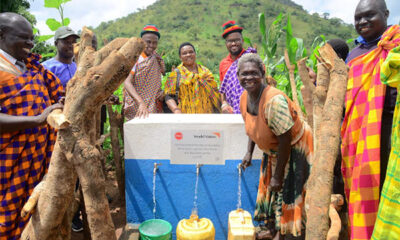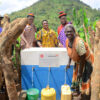Health
Triple Test Targets HIV, Hepatitis B, and Syphilis in Pregnant Women
During the IAS2025 conference in Kigali, global healthcare company Abbott introduced a single-test solution capable of detecting HIV, hepatitis B, and syphilis infections within 20 minutes from a single finger prick, a development health experts say could transform maternal care across the region.
Abbott’s newly launched Determine Antenatal Care Panel (ANC Panel) is a rapid diagnostic test that screens for HIV, hepatitis B, and syphilis in just 20 minutes and it has the potential to transform maternal health services across the continent.
The triple test is a practical solution to a long-standing public health gap of limited, delayed, and inconsistent screening during pregnancy.
While countries like Uganda, Kenya, and Tanzania have made impressive gains in HIV testing among pregnant women, reaching between 75% and 90% coverage, testing for syphilis and hepatitis B remains sporadic and alarmingly low, especially in rural or under-resourced areas. The result? Thousands of babies continue to contract these infections from their mothers each year.
In 2023 alone, 190,000 children in sub-Saharan Africa were newly infected with HIV, most through vertical (mother-to-child) transmission. Similar patterns are seen with congenital syphilis and perinatal hepatitis B conditions that are preventable with early detection and treatment.
The ANC Panel test requires just one finger prick and delivers results in 20 minutes, eliminating the need for multiple blood draws, lab visits, or follow-up appointments, barriers that often prevent women from receiving complete prenatal screening.
Dr. Missiani Ochwoto, who presented findings from a recent field study, highlighted the impact:
“More than 95% of women we surveyed had never been tested for all three infections. This test is not only accurate but practical as it fills a critical gap in antenatal care.”
Beyond its diagnostic precision, the study showed that the ANC Panel cut clinic time by nearly two-thirds, freeing up health workers and reducing patient wait times from 113 minutes to 39.
The innovation is being hailed as a key driver of Africa’s elimination of mother-to-child transmission (eMTCT) targets. Countries across the continent have committed to WHO’s 2030 goals for ending transmission of HIV, hepatitis B, and syphilis but progress has been uneven, largely due to poor diagnostic access and infrastructure.
With this new test, Abbott brings years of HIV prevention experience to a broader front.
“We are extending our 25-year commitment beyond HIV. This tool will help protect both mothers and their children from three preventable diseases,” said Steven Henn, Abbott’s Head of Global Commercial Operations for Rapid Diagnostics.
Experts at IAS2025 praised the test as a symbol of African ownership in health innovation.
“What excites me most is that countries themselves are leading this effort. We’re seeing up to 99% testing coverage with this panel, an unimaginable number just a few years ago,” ,” said Dr. Deborah Birx, former U.S. Global AIDS Coordinator.
By streamlining three tests into one, the ANC Panel strengthens existing healthcare systems rather than overburdening them. It fits seamlessly into antenatal care routines, increases efficiency, and significantly reduces out-of-pocket costs for expectant mothers.
Abbott’s ANC Panel comes at a time when maternal and newborn health still faces immense challenges in Africa. It’s more than a new product. It’s a lifeline for the millions of mothers who still don’t have access to comprehensive antenatal screening.
And as countries race against time to meet global disease elimination goals, this tiny device, barely larger than a coin could become one of the most important tools in Africa’s maternal health arsenal.
Comments

























